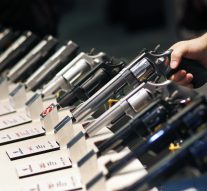
Gun Violence and the Law
News & Politics April 17, 2017By Grace Zani and Taylor Rice
Every year, countless lives are lost due to violence with guns and statistically, over the past decade in America, “more than 100,000 people have been killed as a result of gun violence—and millions more have been the victim of assaults, robberies, and other crimes involving a gun”. There are many gun laws set in place to help decrease the rate of gun violence. One of the first was The Gun Control Act of 1968, which prohibited the sale of firearms to several categories of individuals, including people under 18 years old, those with criminal records, the mentally disabled, unlawful aliens, dishonorably discharged military personnel, and others. While this law and many others, such as the “Brady Handgun Violence Prevention Act”, which states that all unlicensed people purchasing a firearm from a federally licensed dealer must have a background check, have assisted, there is still the ongoing issue of gun violence in America.
While the government set gun laws are required, each state has their own laws assisting in the decline of gun violence in America. Individual states have their own laws involving the right to carry a gun, requiring individuals to obtain a permit in most states. There are a total of five different issues associated with the right to carry a gun, and according to NRA-ILA, most states enforce the Shall Issue, which states that “upon completion of specified requirements, a law-abiding person shall be granted a permit to carry concealed firearms.” Many other states have different laws set in place about being able to carry a gun: Discretionary/Reasonable Issue,
No Permit Required, Rights Restricted – Very Limited Issue, Rights Infringed/Non-Issue. Currently, there are many federal gun laws that every state has to abide by, as well as the individual laws that each state has put into effect, but are these laws benefitting America and preventing gun violence? They have been effective in preventing criminals from obtaining a gun because “background checks blocked 192,043 prohibited persons from gaining access to firearms, including 82,000 felons or roughly 225 felons every day.” Although these laws have prevented many individuals with criminal offenses from getting a gun, USA Today claimed that there are still many ways to legally purchase a gun: A gun store, a pawn shop, a gun show, a friend, family member, neighbor, or internet sale. It is too easy to legally own a gun in the United States, which ultimately leads to an increase in gun related incidents even with the state and federal laws.
Although the acts and laws that were put into effect prevented many drastic outcomes regarding gun violence, there are still many flaws because in 2015 alone, there were 372 mass shootings that occurred, killing 475 and wounding 1,870 individuals. The city of Chicago alone reported 4,331 shooting victims in 2016. The states with the stricter laws have significantly fewer reports of gun violence as compared to other states, such as Illinois, who has the leading amount of fatalities related to guns.
After incidents such as the shooting at Emanuel Church and Sandy Hook Elementary, President Obama tried to pass various new laws revolving around guns. During President Obama’s second term there were many gun shooting incidents. Due to all of these violent shootings Obama asked “Congress to pass laws that would: require background checks on all gun sales; restore a ban on “military-style assault weapons”; ban gun magazines with capacities of more than 10 rounds; and toughen penalties on people who sell guns to those who can’t have them”. In addition to asking Congress to pass those laws, he also signed 23 executive actions. Congress denied passing the laws so Obama said he would strengthen the laws that were already set. With all of these laws and Executive actions in place, why are we still faced with numerous amounts of gun violence and deaths caused by guns? What changes and new laws should be placed to help decrease gun violence in America? What laws do other countries have and how well are they working? These questions will be further addressed in our final article.
To read the first article in this series, click here.
Header photo from Engadget.





